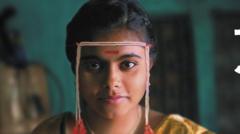The concept of marriage is often romanticized, but in India, the reality can be starkly different, particularly in arranged marriages. The new Marathi film "Sthal: A Match," which has gained critical acclaim at festivals both domestically and internationally, delves into this complex tradition. Directed by Jayant Digambar Somalkar, the film is set to hit theaters in India this Friday and addresses the pressures faced by women in a patriarchal setting, centered around the character of Savita.
Savita, portrayed by first-time actress Nandini Chikte, is caught in a cycle where her father, Daulatrao Wandhare, a cotton farmer from rural Maharashtra, seeks to find a suitable husband for her. The film starkly illustrates the “humiliating” scrutiny young women endure during the matrimonial process—a departure from the typical Bollywood portrayal of weddings as filled with joy and glamour.
From her initial interactions with prospective grooms, Savita's discomfort is palpable. While she yearns for an education and a career, societal norms dictate that marriage is her primary goal. Every aspect of Savita's physical appearance is evaluated; her skin tone and height scrutinized during meetings, which starkly contrasts with the lack of similar attention given to the grooms.
The film also tackles the pervasive issue of dowry. Despite being illegal for over six decades, dowry payments continue to burden families, leading to severe financial strain and even violence against brides. Savita's family faces the grim reality of having to consider selling their land to meet dowry demands.
Somalkar’s vision for "Sthal" stems from his personal experiences growing up in a family where arranged marriages were commonplace. His discomfort during one such meeting led him to question the traditions that objectify women and offer them little autonomy. He seeks to spark a broader dialogue about these issues, recognizing that while one film cannot enact societal change overnight, it can contribute to a vital conversation.
While "Sthal" is not the first film to address arranged marriages—30 others have been released in the last two decades—it distinguishes itself by showcasing the harsh realities faced by many women, which are often overshadowed by the glamor of weddings depicted in popular media. As Somalkar notes, most portrayals only reflect the lives of the wealthy and educated, leaving out the perspectives of the majority struggling within traditional frameworks.
As "Sthal" prepares to captivate audiences in India, it invites viewers to reflect on the intersection of tradition, gender, and societal expectations, making it a timely and powerful work, poised to resonate with many.





















